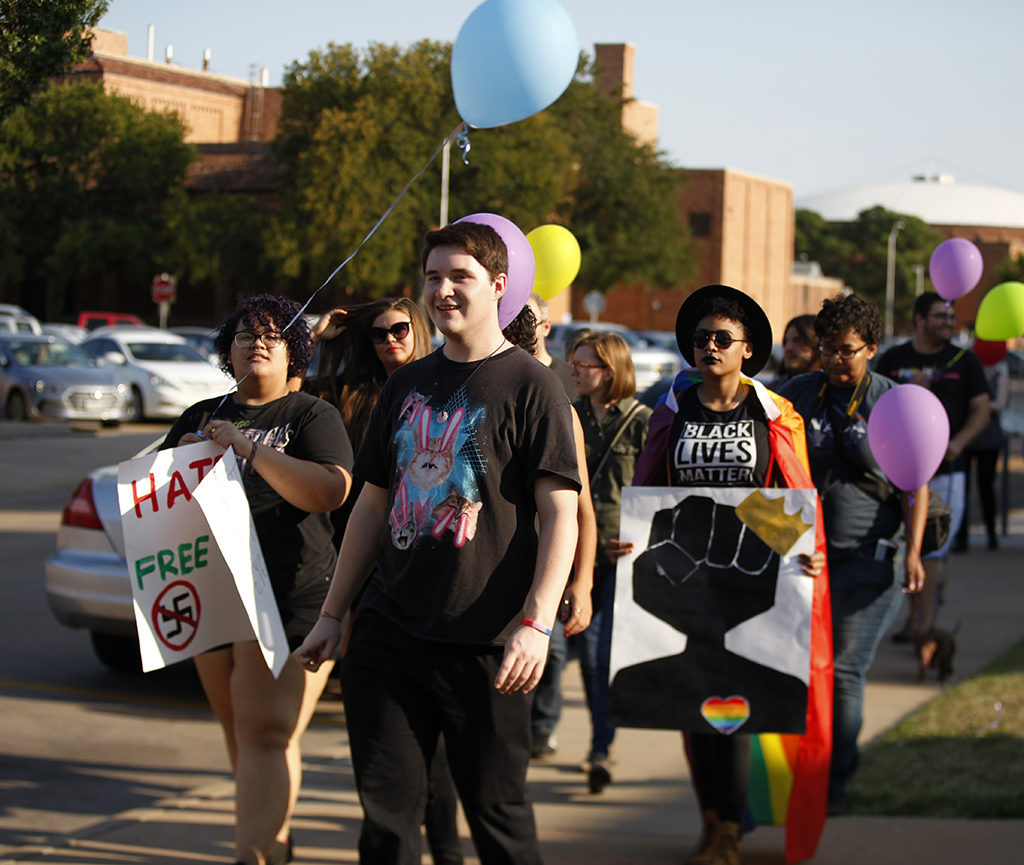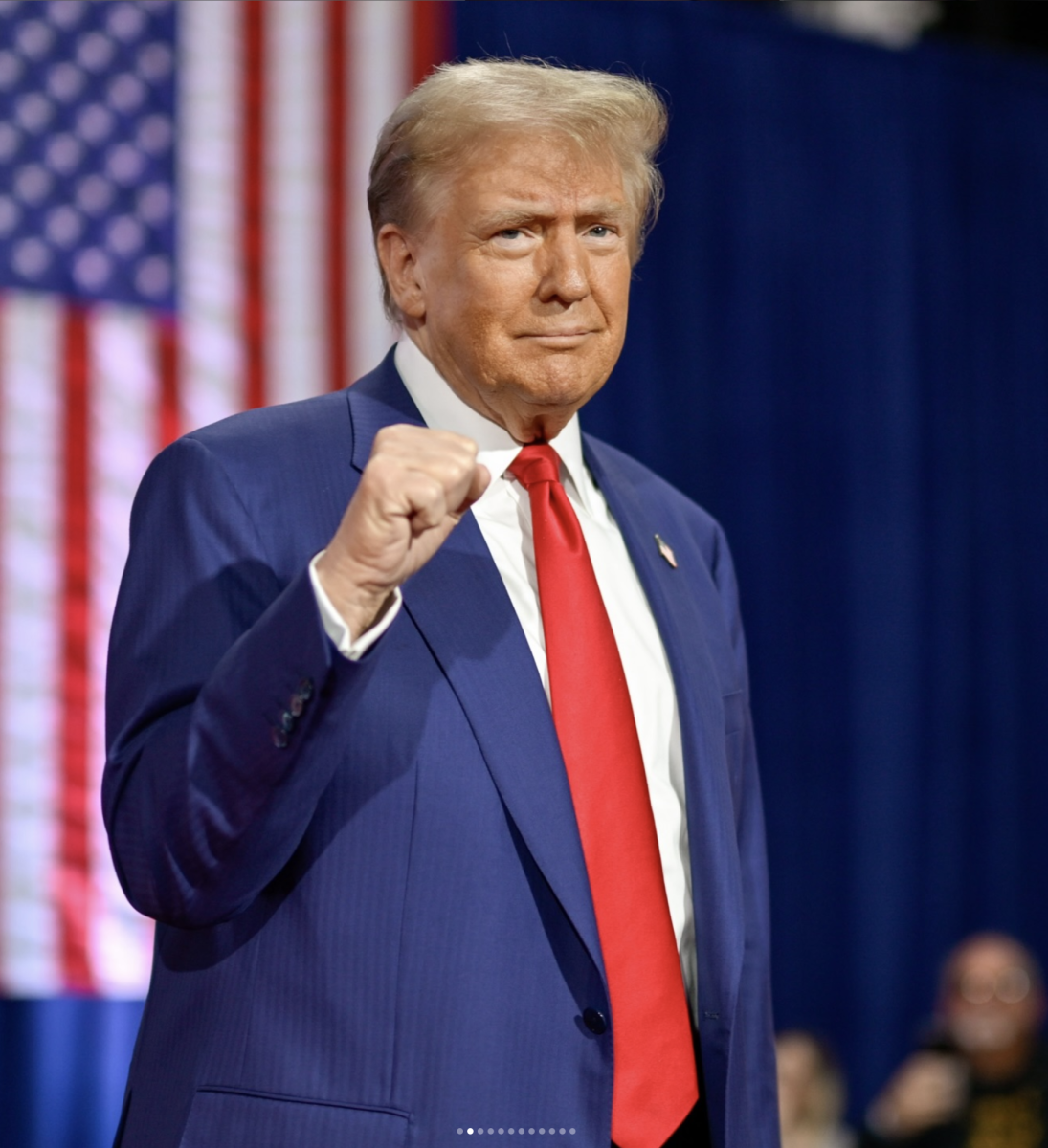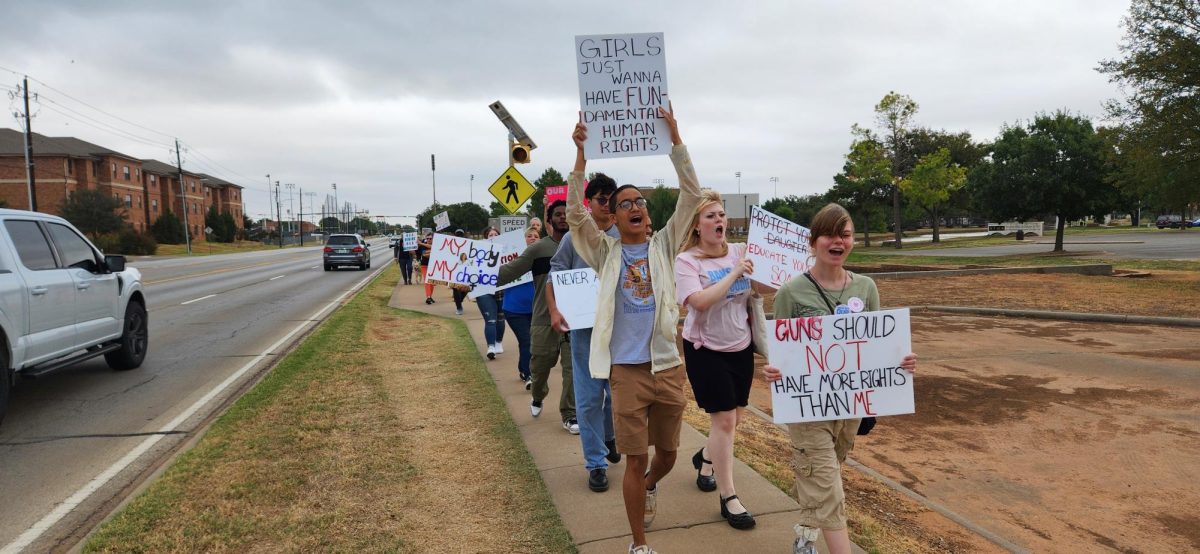
Peaceful protesting, powerful speeches on resisting hate and the apparent subjectivity of hate speech. The Resist Hate Rally, sponsored by Indivisible Wichita Falls and PRIDE, was spearheaded by Kalli Root, English junior. The rally, entitled “Resist Hate” due to Root’s peaceful intentions, was intended to show that MSU students are against any kind of hatred or intolerance.
Last academic year, two rallies were held in the spring semester alone — none in the fall. Root said she wanted to host a rally earlier this year because she wanted to react quickly to this message, considering the events of Charlottesville, Virginia in early August.
“We were thinking that nobody’s going home, like all the students will still be on campus. And also with these kind of things, you have to react quickly. If we had waited much longer, it wouldn’t be as relevant,” Root said.
Root attended the two campus rallies last semester, and she said this rally was important for students, from new freshman to seniors, to have a more accessible way to get involved and make a stance on bigger issues.
“What’s easier than having it outside their dorms?” Root said.
Root also stated that Sunwatcher Plaza was an optimal venue due its large space and amphitheater. She felt that the on campus setting gave an opportunity for many students to be involved and express their viewpoints.
This was true for Catherine Stepniak, psychology and sociology senior. Stepniak said she decided to the attend the rally because she wanted to be supportive.
“I want to show support for everyone and make sure that everyone at MSU feels welcomed,” Stepniak said. “It’s important to stop the spread of hate and show that there are people who will fight against it.”
Holding up her sign “Hate Speech Is Not Free Speech,” mass communication sophomore Zarya Maitao shared similar views to Stepniak on the importance of hosting an event like this on campus.
“It’s about showing people that no matter what hate we face, we’re still going to be here and we’re not going to back down just because there’s hate groups out there,” Maitao said. “Because together, we are strong.”
Maitao also said she believes that this rally will make all students feel like they have a place on this campus, no matter their race, color, creed, sex, gender or sexual orientation.
“When things like this happen on campus, it shows people that they have a place here. That they can feel safe on campus, because they can know there are people like them on campus,” Maitao said. “It’s really important to feel like you belong and that’s what we’re trying to do here.”
While some thought there would be a small turnout due to the rally falling on Labor Day weekend, some were satisfied with the turnout, including Maitao and Christopher Cruz, theater junior.
Cruz said he liked the idea of the rally being held during the first week of school.
“It gives the campus a vibe that we’re all here for positivity,” Cruz said. “Whatever happens next, I’ll be there.”
Although Matt Park, associate vice president for student affairs and dean of students, has stated that is not in his place to speak on the timing of the event, he did understand the decision to host it early on in the year.
“I can certainly respect if the organization wanted to it sooner than later while the issues are still fresh in our minds and perspectives of what’s going on the national level after the Charlottesville situation,” Park said.
Later on in the rally, Nathan Jun, associate professor of philosophy, Claudia Montoya, associate professor of Spanish, and Melanie Martinez, reverend at Metropolitan Community Church, gave speeches on putting an end to hate, dismantling racists institutions and not accepting hate in our society.
Jun spoke first, recounting his own experience with hatred when he was 18 years old.
“I was beaten within an inch of my life by neo-Nazi skinheads. I still have a scar on my face to bare witness to this assault. This country was built on a legacy of settler colonialism, genocide and channel slavery. The legacy of those institutions have never been adequately dealt with,” Jun said. “The ultimate focus of anti-racism resistance should not be battling white supremacists and their organizations, but rather dismantling the already existing forms of structural institutional racism they seek to defend and build upon.”
Montoya spoke next, starting her speech with a quote from a Donald Trump presidential rally.
“We know who is endorsing this type of behavior…I may not be a nice person, but I am a person of principles. You have to be sure, before you engage in anything, before you agree or disagree with anybody — first, look inside,” Montoya said. “What are your principles? What are you willing to fight for? And how? There people who join causes, without thinking of their principles, who are being manipulated by people who know exactly what they are doing.”
She acknowledged counterprotestors and mechanical engineering seniors Brady Burross and Nick Wolf, who stood near a tree away from the rally supporters.
“They told us not to engage. Yes, you’re right to not engage with a person that puts up a stupid sign that says ‘Hate speech is free speech,'” Montoya said. “Somebody that endorses hate should be dealt with definitely and seriously. You don’t have any place here because this is a march for love, not for hate. For unity.”
Rev. Melanie Martinez, the third and final speaker, opened her speech asking the attendees if they were ready to stop listening to hate and told the crowd about her own experiences with being “different.”
“I am genderqueer, same-sex loving, female-bodied, and Mexican-Irish-Cherokee,” Martinez said. “I have dealt and struggled with hate all my life.”
After the conclusion of these powerful speeches, Burross shared his viewpoint of subjectivity. Burross and Wolf donned dark sunglasses and a “Hate speech = free speech” sign.
“My point is basically what he’s [Nick Wolf] saying over there. Hate speech is very subjective, right? And, if you end up banning things like hate speech, then it just ends up…the next people in power are going to ban what they think is hate speech. So the point is, it’s so subjective because there is no objective standard of hate speech,” Burross said.
He said he feels that this argument goes back to transgender people.
“We’ve had teachers in New York and Canada go to jail because they refused to call someone by their preferred pronouns. So it basically goes back to transgender people,” Burross said. “They can identify by however they want — I don’t care what a transgender person does. It doesn’t affect my life at all, but when you tell me I have to call you a certain thing or else I have to face the repercussions, that is when I have to draw the line. You can do what you want, you dress how you like, call yourself whatever but I don’t have to participate in it.”






















